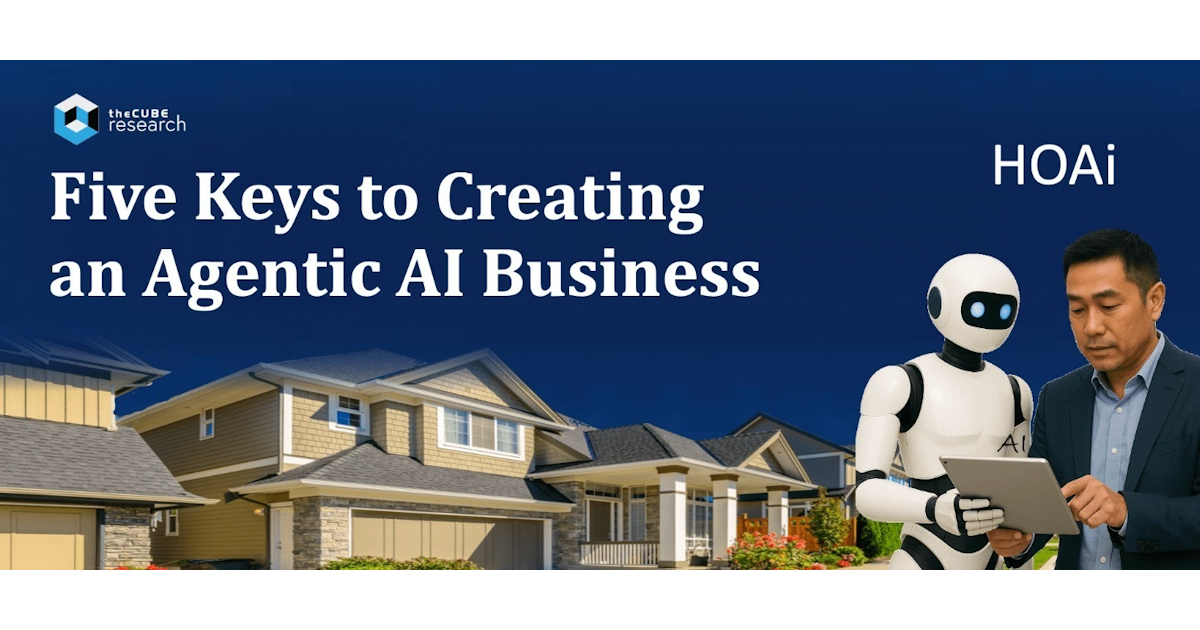Startups that succeed in the agentic AI space are betting on vertical specialization, digital labor and new kinds of software primitives. Rather than broad platforms, these companies are zeroing in on deep domain challenges and embedding AI agents where judgment, context and autonomy matter most.
In theCUBE Research’s latest analysis, discussed in the “Next Frontiers of AI” podcast, Haoyu Zha, founder and chief executive officer of HOAi, joins theCUBE Research’s Scott Hebner, the podcast’s host. Their conversation centers on the keys to creating a successful agentic business.
“We’re not replacing existing software; we’re creating value that wasn’t possible before,” Zha said, reflecting on HOAi’s strategy to go after overlooked verticals. The company’s solution has rapidly scaled to now support over one million homeowners under management by homeowner associations, he added.
The keys to unlocking the potential of agentic AI
To distill the lessons from HOAi and similar innovators, here are five keys to building a successful agentic AI startup, according to Zha and Hebner:
- Go vertical in nuanced markets: Specialized agents can capture untapped value in industries with unique operational needs.
- Follow the labor spend, not the IT: Labor budgets are significantly larger than IT budgets and far less saturated.
- Empower decisions over tasks: Build agents that enhance human judgment, not just automation. Decision intelligence is the new strategic edge.
- Rethink software: Go agentic: Don’t retrofit software-as-a-service blueprints. Design end-to-end workflows with autonomous, context-aware agents from the ground up.
- Visibility fuels viability: In a crowded market, discovery matters. Build brand awareness early or risk being invisible, regardless of how advanced your tech is.
Instead of retrofitting yesterday’s SaaS models, HOAi focuses on a labor-intensive, highly contextual domain: Homeowner association management. That clarity of focus enables the company to design agentic systems with three core components: cognitive reasoning engines, seamless integration with existing workflows and a flexible orchestration layer for agents.
“Agentic AI is meant to really get the work done end-to-end, not just simply automating repetitive tasks,” Zha emphasized.
By targeting labor spend rather than IT budgets, startups such as HOAi create new categories of digital workers that operate alongside humans. This shift enables access to budgets that are 10–20 times larger than traditional enterprise IT, according to Zha.
“We’re not just building software,” he said. We’re delivering a new workforce.”
These AI coworkers interpret unstructured data, make micro-decisions and complete full workflows under human supervision, freeing people to focus on higher-value roles.
As enterprises look for more reliable AI-driven insights, decision intelligence is emerging as a critical tool for shaping the future of intelligent automation. For a deeper dive into Hebner and Zha’s discussion, part of the “Next Frontiers of AI” podcast series, check out their full conversation:
Image: News
Your vote of support is important to us and it helps us keep the content FREE.
One click below supports our mission to provide free, deep, and relevant content.
Join our community on YouTube
Join the community that includes more than 15,000 #CubeAlumni experts, including Amazon.com CEO Andy Jassy, Dell Technologies founder and CEO Michael Dell, Intel CEO Pat Gelsinger, and many more luminaries and experts.
THANK YOU









